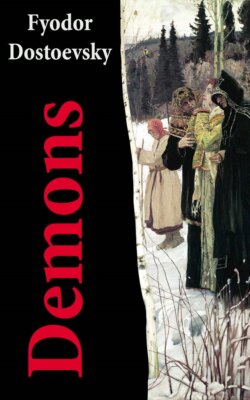Читать книгу Demons (The Possessed / The Devils) - The Unabridged Garnett Translation - Fyodor Dostoevsky - Страница 7
На сайте Литреса книга снята с продажи.
III
ОглавлениеThere are strange friendships. The two friends are always ready to fly at one another, and go on like that all their lives, and yet they cannot separate. Parting, in fact, is utterly impossible. The one who has begun the quarrel and separated will be the first to fall ill and even die, perhaps, if the separation comes off. I know for a positive fact that several times Stepan Trofimovitch has jumped up from the sofa and beaten the wall with his fists after the most intimate and emotional tete-a-tete with Varvara Petrovna.
This proceeding was by no means an empty symbol; indeed, on one occasion, he broke some plaster off the wall. It may be asked how I come to know such delicate details. What if I were myself a witness of it? What if Stepan Trofimovitch himself has, on more than one occasion, sobbed on my shoulder while he described to me in lurid colours all his most secret feelings. (And what was there he did not say at such times!) But what almost always happened after these tearful outbreaks was that next day he was ready to crucify himself for his ingratitude. He would send for me in a hurry or run over to see me simply to assure me that Varvara Petrovna was “an angel of honour and delicacy, while he was very much the opposite.” He did not only run to confide in me, but, on more than one occasion, described it all to her in the most eloquent letter, and wrote a full signed confession that no longer ago than the day before he had told an outsider that she kept him out of vanity, that she was envious of his talents and erudition, that she hated him and was only afraid to express her hatred openly, dreading that he would leave her and so damage her literary reputation, that this drove him to self-contempt, and he was resolved to die a violent death, and that he was waiting for the final word from her which would decide everything, and so on and so on in the same style. You can fancy after this what an hysterical pitch the nervous outbreaks of this most innocent of all fifty-year-old infants sometimes reached! I once read one of these letters after some quarrel between them, arising from a trivial matter, but growing venomous as it went on. I was horrified and besought him not to send it.
“I must . . . more honourable . . . duty . . . I shall die if I don't confess everything, everything!” he answered almost in delirium, and he did send the letter.
That was the difference between them, that Varvara Petrovna never would have sent such a letter. It is true that he was passionately fond of writing, he wrote to her though he lived in the same house, and during hysterical interludes he would write two letters a day. I know for a fact that she always read these letters with the greatest attention, even when she received two a day, and after reading them she put them away in a special drawer, sorted and annotated; moreover, she pondered them in her heart. But she kept her friend all day without an answer, met him as though there were nothing the matter, exactly as though nothing special had happened the day before. By degrees she broke him in so completely that at last he did not himself dare to allude to what had happened the day before, and only glanced into her eyes at times. But she never forgot anything, while he sometimes forgot too quickly, and encouraged by her composure he would not infrequently, if friends came in, laugh and make jokes over the champagne the very same day. With what malignancy she must have looked at him at such moments, while he noticed nothing! Perhaps in a week's time, a month's time, or even six months later, chancing to recall some phrase in such a letter, and then the whole letter with all its attendant circumstances, he would suddenly grow hot with shame, and be so upset that he fell ill with one of his attacks of “summer cholera.” These attacks of a sort of “summer cholera” were, in some cases, the regular consequence of his nervous agitations and were an interesting peculiarity of his physical constitution.
No doubt Varvara Petrovna did very often hate him. But there was one thing he had not discerned up to the end: that was that he had become for her a son, her creation, even, one may say, her invention; he had become flesh of her flesh, and she kept and supported him not simply from “envy of his talents.” And how wounded she must have been by such suppositions! An inexhaustible love for him lay concealed in her heart in the midst of continual hatred, jealousy, and contempt. She would not let a speck of dust fall upon him, coddled him up for twenty-two years, would not have slept for nights together if there were the faintest breath against his reputation as a poet, a learned man, and a public character. She had invented him, and had been the first to believe in her own invention. He was, after a fashion, her day-dream. . . . But in return she exacted a great deal from him, sometimes even slavishness. It was incredible how long she harboured resentment. I have two anecdotes to tell about that.
